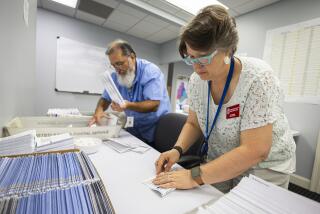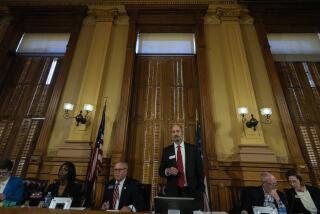House OKs an Overhaul of Elections
- Share via
WASHINGTON — Exactly one year after a historic Supreme Court ruling cleared the way for George W. Bush to claim the presidency, the House on Wednesday approved legislation to significantly upgrade the nation’s much-maligned election machinery and in other ways improve the voting process.
A top goal of the bill, approved 362 to 63, is to junk the equipment that made “hanging chads” a household phrase during the disputed Florida recount. To accomplish that, the legislation would provide $400 million to states--including Florida and California--to help them replace punch-card ballot machines.
One of the measure’s chief sponsors, Rep. Robert W. Ney (R-Ohio), told the House he hopes someday voters can find the punch-card machines only “in the Smithsonian.”
The bipartisan House approval renewed momentum for a reform movement that had stalled soon after Bush was sworn in as president. The White House praised the House action and similar legislation is expected to be debated in the Senate early next year. Passage in that chamber, however, is by no means assured.
The extraordinarily close 2000 presidential election exposed flaws beyond error-prone voting equipment, and the House bill also aims to fix those problems.
If it becomes law, all states would be required to meet new federal standards for elections. Among them:
* A system to maintain accurate voter registration lists.
* Uniform rules for what constitutes a valid vote.
* A procedure to ensure the counting of ballots mailed in by overseas and military voters.
In addition, states would be required to give voters a chance to correct mistakes they discover at the polling station. And most states--with exceptions for those that provide all-mail voting or same-day registration--would be required to provide ballots to people who claim to be valid voters but whose names fail to show up on precinct lists.
Election officials would later verify or disqualify those “provisional” ballots.
The bill’s backers called these and other proposed new federal standards potentially the most significant steps to open up the democratic process since the landmark civil rights reforms of the 1960s.
Some critics, mainly liberal Democrats, said the House bill would not go far enough to guarantee equal access to voting by minorities, people with disabilities and others. The critics also said they feared some states would ignore the new standards.
Advocates said that the measure’s implementation would be monitored by a new, bipartisan Election Assistance Commission and that cases of noncompliance could be referred to the Justice Department.
The arguments reflected the delicate politics at issue in reforming a system that historically has been administered by state and local officials, with minimal federal direction. Backers of the House bill stressed that while their legislation would require states to meet new standards, local officials would enjoy great freedom in their implementation.
Rep. John Lewis (D-Ga.), a leading civil rights activist, praised the bill as a step toward ensuring that “what happened in Florida last year and so many other places in our nation [would] never, ever happen again.”
Along with the money to replace punch-card machines, the bill would authorize $2.25 billion to be spent nationwide to make other repairs to a system that all sides agree needs work.
California would be in line for the largest share of the bill’s overall funding, about $345 million. Of that amount, about $80 million would be earmarked for replacing punch-card machinery in Los Angeles County and elsewhere. The rest could be spent on training poll workers, improving disability access at polling places, educating voters about rights and responsibilities and other improvements.
Advocates hope the legislation will become law in time to fix potential problems before the 2004 presidential election, and perhaps spur improvements in the 2002 midterm elections.
Bush has not endorsed a specific election reform bill, for the most part steering clear of a subject that rekindles memories of the disputed Florida recount. Many of his backers say the nation simply should move on. Many supporters of former Democratic presidential candidate Al Gore, however, continue to decry the Dec. 12, 2000, split decision by the U.S. Supreme Court, which effectively ended the Florida recount and sealed Bush’s 537-vote margin of victory in that decisive state.
But it has appeared in recent months that wounds from the 2000 presidential contest are healing on both sides, a process accelerated by the national unity prompted by the Sept. 11 terrorist attacks. That, in turn, could help the legislation clear Congress with a minimum of partisan rancor.
White House Press Secretary Ari Fleischer called Wednesday’s House vote “a positive step forward.”
The bill was supported by 196 Republicans, 165 Democrats and one independent. Opposing it were 20 Republicans, 42 Democrats and another independent.
Among the 52 members of the California delegation, these representatives voted against the bill: Xavier Becerra (D-Los Angeles), Grace F. Napolitano (D-Norwalk), Nancy Pelosi (D-San Francisco), Richard W. Pombo (R-Tracy), Dana Rohrabacher (R-Huntington Beach), Lucille Roybal-Allard (D-Los Angeles), Loretta Sanchez (D-Garden Grove), Hilda L. Solis (D-El Monte) and Maxine Waters (D-Los Angeles). Rep. Calvin M. Dooley (D-Hanford) did not vote.
Waters led an effort earlier this year by House Democrats to conduct hearings on election problems around the country and propose reforms.
Explaining her vote against the House bill, Waters said it “does not solve the problems that were encountered in the presidential election. It does not go far enough to ensure that everybody who is registered can vote and that those votes will be protected.”
*
Times staff writer Edwin Chen contributed to this story.
More to Read
Get the L.A. Times Politics newsletter
Deeply reported insights into legislation, politics and policy from Sacramento, Washington and beyond. In your inbox twice per week.
You may occasionally receive promotional content from the Los Angeles Times.









